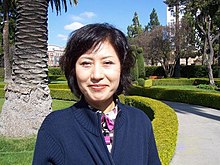Mihee Eun (Eun, Mihee) | |
|---|---|
 Mihee Eun in 2008; photograph by Il Chun Lee. | |
| Born | 20 September 1960 Mokpo, South Jeolla Province, South Korea |
| Occupation | Novelist, essayist, college lecturer, columnist |
| Nationality | South Korean |
| Alma mater | Gwangju University |
| Notable works | People in Columbarium Minority's Love Song of the Wind Ten Thousand and Two Brewing Women The First Experience at 18 Flutter, Flutter, Butterfly |
| Spouse | Single |
| Korean name | |
| Hangul | 은미희 |
|---|---|
| Hanja | 殷美姬 |
| Revised Romanization | Eun Mihui |
| McCune–Reischauer | Ŭn Mihŭi |
Eun, Mihee (Korean: 은미희; born on September 20, 1960) is a South Korean novelist, writer, columnist, and a college lecturer.[1] She was born in Mokpo, South Jeolla Province in southern South Korea and moved to Gwangju at 3 years old and grew up there. She was a radio actress at Munhwa Broadcasting Corporation in Gwangju in her early 20s and became a journalist at Jeonnam Maeil newspaper later. While working as a journalist, she realized that she really wanted to be a novelist. She started her work as a novelist and she won first prize the Jeonnam Ilbo Literature Award for the short novel What Kind of Silkworm's Dream in Cocoon in 1996. After that, she won the Munhwa Ilbo Literature Award in 1999 for another short novel: Bird Fly Again.
She received the Samsung Literature Award in 2001 for People in Columbarium, which is a novel of poor peoples' lives at an inn in a small town.[2] Her novel Minority's Love received a good review. It depicted the unique and serious introspection about life in the shadow of the past as dealing with the dark side of love and life such as love between relatives and the same sex, which were contradicted, and not allowed socially. When she released the Song of the Wind based on interviews with strolling candy-selling entertainers that can be called as modern strolling-actors, she received sincere attention from the media about her literary skill — revealing the people's characters while describing the joys and sorrows of their lives.
Her first collection of short stories, Ten Thousand and Two Brewing Women, received compliments because she expressed the nobility of life in detail through people lead lonely daily lives. Her other her novels are The First Experience at 18, Wind Man Tree Woman, John Paul II, etc.[3]
- ^ "은미희 | Digital Library of Korean Literature (LTI Korea)". library.klti.or.kr. Retrieved 8 November 2017.
- ^ "[문학]삼성문학상 수상자 3명 선정". 동아닷컴 (in Korean). 20 August 2001. Retrieved 8 November 2017.
- ^ "Amazon.co.uk: Eun Mihee: Books". www.amazon.co.uk. Retrieved 8 November 2017.